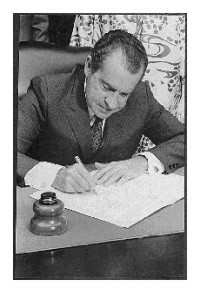Sponsor this page. Your banner or text ad can fill the space above.
Click here to Sponsor the page and how to reserve your ad.
-
Timeline
1966 - Detail
November 8, 1966 - The first black United States Senator in eighty-five years, Edward Brooke, is elected to Congress. Brooke was the Republican candidate from Massachusetts and former Attorney General of that state.

Article by Jason Donovan
In the timeline of the chronicles of American history there have been a
continuous line of individuals who dared to be first. In the 1960's there were many firsts,
especially within the struggle for racial equality. One of those firsts was that of Edward
Brooke III, the first African American since Reconstruction to be popularly voted into
the United States Senate in 1966, as well as the first African American to be elected
from Massachusetts.
Brooke was born in Washington D.C., 26 October 1919. His father was an
attorney review for the Veterans Administration which afforded him a middle class
upbringing. As he grew up racism was always in his face whether he was living in
African American neighborhoods or in neighborhoods with extreme segregation rules
that they they needed a pass from a white person living in the
neighborhood to pass through. Even though he lived in segregation he did not ever experience the
racial persecution that was the norm in many areas during the Jim Crow era. Brooke's
middle class standing allowed him to attend Paul Lawrence Dunbar High School,
Washington D.C.'s high school for blacks that was on par with the white schools in the region.
Brooke considered himself "blessed to have been able to attend" the "best negro high
school school in America." Howard University was the next stop on his educational path; he earned a
Bachelor's of Sociology degree in 1941.

Military Service
Then World War II came calling. He would start his infantry service in 1941. During his service, he defended individuals in court marshal
proceedings. He would honorably serve in the all black 366th Combat Infantry Regiment.
He distinguished himself during the Italian campaign when, with his fluency in Italian
and lighter complexion, he was able to cross enemy lines to work with anti-fascist
forces. He would be discharged with the rank of captain and earned a Bronze Star and
the Distinguished Service Award from the U.S. Military. He experienced rampent racism
during his service. He has been quoted on his military service saying,..."In every regard,
we were treated as second-class soldiers, if not worse, and we were angry. I felt
personal frustration and bitterness I had not known before in my life."
After Military Service and Graduation
After the war he continued his educational path. He would earn a bachelor's degree in law or LLB in
1948 and a masters in law or LLM in 1949 from Boston University. While in college he
also was the editor of the Boston University Law Review.
Following graduation he turned down multiple offers to join an established law
firm. Instead choosing to go his own way, he established his own law firm in the Boston
neighborhood of Roxbury, a neighborhood whose population consisted of mostly
African Americans. Through his hard work in the community he formed relationships
and connections that would help him in the future.
Brooke Starts His Political Career
Brooke would begin his political career in 1950. Even though he did well in those
years, he failed to secure a victory. In 1960, he was named chairman of Boston's
Finance Commission. In this position he was an anti-corruption crusader shining light
on the darkness of corruption within city government. With his hard work on full display,
he was elected to the position of Massachusetts's Attorney General. By winning this position he
would make history as the first African American to hold the position. Brooke would be
elected to this position for two terms.
1966 would bring a political promotion when he was elected to the U.S. Senate.
He ran as a Republican. He walked a moderate path. While campaigning he said he
would strive for "the entablement of, peace, the preservation of freedom for all who desire it, and a better life for people at home and abroad." He described "himself as a creative Republican." When the 1966 Senate Race results came in, he won with 62 percent of the
vote. He once again made history being the first African American to win the popular
vote for a U.S. Senate race and the first of his race to be seated since post Civil War
Reconstruction. He would take an active role in his position.
Brooke's fellow senators gave him a standing ovation on his first day of the
congressional session. Through out his congressional career he would continue to be a
moderate in his party, continually reaching across the political aisle in order to find
common ground, and as a result sponsored or cosponsored 624 pieces of legislation.
According to congress.gov, the main area of concentration of legislation that he either
sponsored or co-sponsored was social welfare, health, and international affairs to just
name a few. Records on the site regarding Senator Brooke's congressional activities
only start in 1973.
He made history in another way when he had a large impact on the civil rights
movement. President Johnson chose him as a member of the National Commission on
Civil Disorders, also known as the Kerner Commission. This commission looked into
the deadly unrest that was gripping the nation at the time. The commission showed
that contrary to popular belief the cause of the riots across the nation were the result of
systemic racism perpetrated in the name of and "condoned by white society." It was not
black anger that was being the prominent narrative pushed at the time. The commission
also found that "the nation was so divided that the United States was poised to
fracture into two radically unequal societies, one black one white."
All the hard work the Kerner Commission dedicated to its task would pay off
with the passing of a landmark law, The Voting Rights Act of 1965. The Act removed
barriers to voting based on race. The Act also removed barriers put in place in the south
that stopped eligible African Americans and other minorities from voting. The law
changed the electoral landscape in all following elections.
Senator Brooke would have an impact in other areas as well. He was pivotal in many other pieces of legislation from the 1968 Fair Housing
Act. This Act curbed discrimination in housing and established the Office of Fair
Housing and Equal Opportunity, the teeth of the Act. Woman's rights was another area
he played a large role in advancing with his efforts to further the Equal Credit Act and
his defense of "Title IX." These allowed woman to have financial freedom by opening
financial accounts in their own name and protected "educational opportunities and
athletic participation to woman and girls," respectively.
Civil rights were only one area of impact another area is that of international affairs.
During his time in office the Vietnam war and the South African apartheid system
were happening, the hot button issues of the day. Senator Brooke was deeply
involved in opposing both situations. He was part of "fact finding missions to Asia" and
as a result called for the United States to cease its use of napalm. He also called for a
halt to trade with South Africa due to their brutal apartheid system.
In the late 1970's, Senator Brooke's political fortunes would falter. 1976 his fight
for woman's rights continued when he called for abortion to be legalized. He was able
to influence this debate as he served on the Senate Appropriations Committee which
decided Medicaid funding via its Department of Health and Human Services bill. His
efforts would be overwhelmed by the efforts of the anti-abortion lobby. His support for abortion legalization cost him in electoral support by losing the large and highly influential Catholic vote in his constituency. Another body blow was delivered via a
Senate investigation into alleged "financial misconduct." The investigation found that
"he had made false statements" and even though no charges were forthcoming, it cost
him even more support. The third and last hit came via a very public brutal divorce.
The trifecta proved to much for him to overcome. He lost his 1978 reelection bid.
After his political career, he went back to practicing law. He also continued to be
a fixture in the community. He assumed a number of positions such as his involvement
with the Low Income Housing Coalition and the Boston Bank of Commerce where he
held positions of chairman of the board and chairman respectively.
The nation would recognize his contributions to American society. In 2004, President George W. Bush awarded him country's highest civilian honor by awarding
him the Presidential Medal of Freedom. The Congressional Gold Medal would be awarded
to him in 2009. These were only a few awards he received during his lifetime. Some other honors included receiving "thirty-four honorary degrees from the
nations most prestigious colleges and universities." There were others including the
NAACP's Spingarn Medal. Italy would also honor him with the Grand Cross of the
Order of Merit. Massachusetts would dedicate a courthouse to him in the year 2000.
Senator Brooke's long fight for the betterment of American society was a
continuous uphill battle. Even with his struggles he proved himself non dogmatic
continually striving to find common ground with his colleges in order to get things
done. Senator Brooke's long and storied life would come to an end on 3 January 2015,
he was 95.
Photo above: Senator Edward Brooke, 1967, Marion Trikosko. Courtesy Library of Congress. Photo below: President Lyndon Baines Johnson, Senator Brooke behind him, with some members of the National Advisory Commission on Civil Disorders (Kerner Commission) in the Cabinet Room of the White House, 1967, Marion Trikosko. Courtesy Library of Congress. Info source: Edward W. Brooke | Encyclopedia.com; The Editors of Encyclopaedia Britannica. "Edward Brooke | First African American Elected Senator, Civil Rights Activist,"1998; Cane, Clay. "This Day in History: Edward Brooke Elected as First Black U.S.
Senator by Popular Vote in 1966," 2024. The Black Chronicle; BROOKE, Edward William, III | US House of Representatives: History, Art and
Archives; Senator Edward W. Brooke III. (2017, August 11). MV African-American Heritage Trail; "THE HONORABLE EDWARD BROOKE" thehistorymakers.com; Brooke, Edward W. "Edward W. Brooke." Congress.gov, 2025; "Senator Edward W. Brooke III." MV African-American Heritage Trail, 2016; "Edward Brooke-African American Poltical Leaders." Myblackhistory.net, 2015; George, Alice. "The 1968 Kerner Commission Got It Right, but Nobody Listened." Smithsonian, Smithsonian.com, 1 Mar. 2018; Crayton, Kareem. "The Voting Rights Act Explained | Brennan Center for Justice." 2023; Stanford University. "Voting Rights Act of 1965 | the Martin Luther King, Jr. Research and Education Institute." Kinginstitute.stanford.edu, 6 Aug. 1965.







